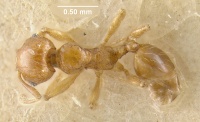Pheidole rosae
| Pheidole rosae | |
|---|---|

| |
| Scientific classification | |
| Kingdom: | Animalia |
| Phylum: | Arthropoda |
| Class: | Insecta |
| Order: | Hymenoptera |
| Family: | Formicidae |
| Subfamily: | Myrmicinae |
| Tribe: | Attini |
| Genus: | Pheidole |
| Species group: | tristis |
| Species: | P. rosae |
| Binomial name | |
| Pheidole rosae Forel, 1901 | |
| Synonyms | |
| |
An inhabitant of subtropical forests. Winged queens and males were present in a nest near Tapia, Tucumán, on 25 January, col. W. L. Brown. (Wilson, 2003)
Identification
See the description in the nomenclature section.
Keys including this Species
Distribution
From Wilson (2003): Recorded from Santa Catarina (type locality) and, as the synonymous “silvestrii,” from Tucumán (type locality), Buenos Aires, and Córdoba, Argentina (Kempf 1972b; W. L. Brown).
Latitudinal Distribution Pattern
Latitudinal Range: -26.732014° to -38.85°.
| North Temperate |
North Subtropical |
Tropical | South Subtropical |
South Temperate |
- Source: AntMaps
Distribution based on Regional Taxon Lists
Neotropical Region: Argentina, Brazil (type locality).
Distribution based on AntMaps
Distribution based on AntWeb specimens
Check data from AntWeb
Countries Occupied
| Number of countries occupied by this species based on AntWiki Regional Taxon Lists. In general, fewer countries occupied indicates a narrower range, while more countries indicates a more widespread species. |

|
Estimated Abundance
| Relative abundance based on number of AntMaps records per species (this species within the purple bar). Fewer records (to the left) indicates a less abundant/encountered species while more records (to the right) indicates more abundant/encountered species. |

|
Biology
Kempf (1974) reported that Oxyepoecus bruchi were collected with P. rosae in Argentina. An observation nest created from a collection of rosae that contained both species found no hostility between these ants.
Castes
Nomenclature
The following information is derived from Barry Bolton's Online Catalogue of the Ants of the World.
- rosae. Pheidole rosae Forel, 1901h: 63 (s.) BRAZIL. Senior synonym of silvestrii: Wilson, 2003: 742.
- silvestrii. Pheidole silvestrii Emery, 1906c: 146 (s.w.q.) ARGENTINA. Junior synonym of rosae: Wilson, 2003: 742.
Unless otherwise noted the text for the remainder of this section is reported from the publication that includes the original description.
Description
From Wilson (2003): DIAGNOSIS Similar in various characters to Pheidole guayasana, Pheidole pidax, Pheidole rosula and Pheidole securigera, distinguished as follows.
Major: reddish yellow; frontal lobes extended forward as conspicuous lobes, as seen in side view; wide, shallow antennal scrobe present; promesonotum descends abruptly and obliquely to metanotum; postpetiolar node spinose; portions of anterior pronotal dorsum and propodeal dorsum carinulate, and rest of mesosoma smooth and shiny.
Minor: several carinulae extend from frontal lobes to occiput, center of occiput carinulate, and rest of posterior dorsal head surface smooth; propodeal spines reduced to denticles.
MEASUREMENTS (mm) Syntype major of synonymous silvestrii: HW 1.40, HL 1.52, SL 0.60, EL 0.16, PW 0.72. Syntype minor of synonymous silvestrii: HW 0.62, HL 0.64, SL 0.58, EL 0.12, PW 0.42.
COLOR Major: concolorous reddish yellow.
Minor: concolorous plain medium yellow.
Figure. Upper: syntype, major of synonymous Pheidole silvestrii Emery (Santa Catarina, Brazil). Lower: syntype, minor of synonymous P. silvestrii Emery (Quebrada Cainzo, Tucumán, Argentina). Scale bars = 1 mm.
Type Material
Brazil: Santa Catarina. Naturhistorisches Museum Wien, Vienna - as reported in Wilson (2003)
Etymology
Eponymous. (Wilson 2003)
References
- Casadei-Ferreira, A., Economo, E.P., Feitosa, R.M. 2020. Additions to the taxonomy of Pheidole (Hymenoptera: Formicidae) from the southern grasslands of Brazil. Revista Brasileira de Entomologia 64(4):e20200068 (doi:10.1590/1806-9665-RBENT-2020-0068).
- Forel, A. 1886b. Espèces nouvelles de fourmis américaines. Ann. Soc. Entomol. Belg. 30:xxxviii-xlix. (page xkii, primary junior homonym of gertrudae)
- Forel, A. 1901m. Formiciden des Naturhistorischen Museums zu Hamburg. Neue Calyptomyrmex-, Dacryon-, Podomyrma- und Echinopla-Arten. Mitt. Naturhist. Mus. Hambg. 18: 43-82 (page 63, soldier described)
- Kempf, W. W. 1972. Catálogo abreviado das formigas da região Neotropical. Stud. Entomol. 15: 3–344.
- Mayr, G. 1887. Südamerikanische Formiciden. Verh. K-K. Zool.-Bot. Ges. Wien 37: 511-632 (page 592, Replacement name for gertrudae)
- Wilson, E. O. 2003. Pheidole in the New World: A dominant, hyperdiverse ant genus. Harvard University Press, Cambridge, MA. (page 742, fig. major, minor described, Senior synonym of silvestrii)
References based on Global Ant Biodiversity Informatics
- Brandao, C.R.F. 1991. Adendos ao catalogo abreviado das formigas da regiao neotropical (Hymenoptera: Formicidae). Rev. Bras. Entomol. 35: 319-412.
- Canepuccia A. D., F. Hidalgo, J. L. Farina, F. Cuezzo, and O. O. Iribarne. 2016. Environmental harshness decreases ant β-diversity between salt marsh and neighboring upland environments. Wetlands DOI 10.1007/s13157-016-0777-0.
- Emery C. 1906. Studi sulle formiche della fauna neotropica. XXVI. Bullettino della Società Entomologica Italiana 37: 107-194.
- Kempf, W.W. 1972. Catalago abreviado das formigas da regiao Neotropical (Hym. Formicidae) Studia Entomologica 15(1-4).
- Kusnezov N. 1962. El vuelo nupcial de las hormigas. Acta Zoologica Lilloana 18: 385-442.
- Rosa da Silva R. 1999. Formigas (Hymenoptera: Formicidae) do oeste de Santa Catarina: historico das coletas e lista atualizada das especies do Estado de Santa Catarina. Biotemas 12(2): 75-100.
- Ulyssea M.A., C. E. Cereto, F. B. Rosumek, R. R. Silva, and B. C. Lopes. 2011. Updated list of ant species (Hymenoptera, Formicidae) recorded in Santa Catarina State, southern Brazil, with a discussion of research advances and priorities. Revista Brasileira de Entomologia 55(4): 603-611.
- de Zolessi, L.C., Y.P. de Abenante and M.E. Philippi. 1987. Lista sistemática de las especies de formícidos del Uruguay. Comunicaciones Zoologicas del Museo de Historia Natural de Montevideo 11(165):1-9
- de Zolessi, L.C., Y.P. de Abenante and M.E. Phillipi. 1989. Catalago Systematico de las Especies de Formicidos del Uruguay (Hymenoptera: Formicidae). Oficina Regional de Ciencia y Technologia de la Unesco para America Latina y el Caribe- ORCYT. Montevideo, Uruguay



